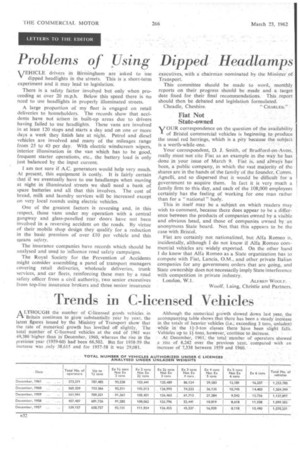Problems of Using
Page 66

If you've noticed an error in this article please click here to report it so we can fix it.
Dipped. Headlamps
VEHICLE drivers in Birmingham are asked to Use v dipped headlights in the streets. This is 'a short-term experiment and it may lead to legislation.
There is a safety factor involved but only when proceeding at over 20 m.p.h. Below this speed there is no need to use headlights in properly illuminated streets.
A large proportion of my fleet is engaged on retail deliveries to householders. The records show that accidents have not arisen in built-up areas due to drivers having failed to use headlights. These vans are involved in at least 120 stops and starts a day and on one or more days a week they finish late at night. Petrol and diesel vehicles are involved and many of the mileages range from 25 to 40 per day. With electric windscreen wipers, interior illumination in the van which has to be good, frequent starter operations, etc., the battery load is only just balanced by the input current.
I am not sure if A.C. generators would help very much. At present, this equipment is costly. It is fairly certain that if we eventually have to use headlamps when moving at night in illuminated streets we shall need a bank of spare batteries and all that this involves. The cost of bread, milk and laundry services will be increased except on very local rounds using electric vehicles.
One of the greatest factors is reversing and, in this respect, those vans under my operation with a central gangway and glass-panelled rear doors have not been involved in a reversing accident on the roads, By virtue of their mobile shop design they qualify for a reduction in the basic premium of over £10 per vehicle and this tueans safety,
The insurance companies have records which should be analysed and used to influence road safety campaigns.
The Royal Society for the Prevention of Accidents might consider assembling a panel of transport managers covering retail deliveries, wholesale deliveries, trunk services, and car fleets, reinforcing these men by a road safety, officer from a civil authority, two senior exceutives from top-line insurance-brokers and three senior insurance
executives, with a chairman nominated by the Minister of Transport.
This committee should be made to work, monthly reports on their progress should be made and a target date fixed for their final recommendations. This repent should then be debated and legislation formulated.
Cheadle, Cheshire. "CHARLES"
Fiat Not . State-owned
yOUR correspondence on the question of the_availability of Bristol commercial vehicles is beginning to produce the usual red herrings, which is a pity -because the subject is a worth-while-one.
Your correspondent, D. J. Smith, of Bradford-on-Avon, really must not cite Fiat as an example in the way he has done in Your issue of March 9. Fiat is, and alWaYs has been, a public company, in which the vast majority of the shares are in the hands of the family of the founder, Comm. Agnelli, and so dispersed that it would be difficult for a government to acquire them. In fact it is very much a family firm to this day, and each of the 108,000 employees certainly has the feeling of working for one man rather than for a " national " body.
This in itself may be a subject on which readers may wish to comment, because there does appear to be a difference between the products of companies owned by a visible and obvious head, and those of companies owned by an anonymous State board. Not that this appears to be the case with Bristol.
Fiat are certainly not nationalized, but Alfa Romeo is, incidentally, although I do not know if Alfa Romeo commercial vehicles arc widely exported. On the other hand I do know that Alfa Romeo as a State organization has to compete with Fiat, Lancia, 0.M., and other private Italian companies for any government orders that are going, and State ownership does not necessarily imply State interference with competition in private industry.
London, W.I. ALFRED WooLr. Woolf, Laing, Christie and Partners.




















































































































